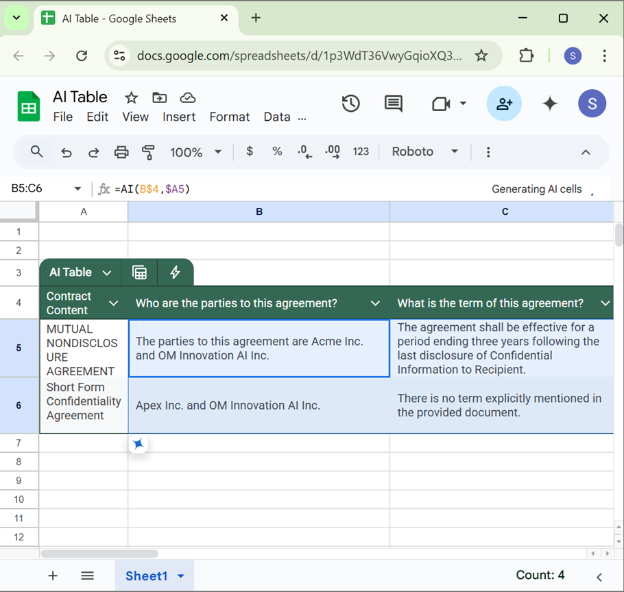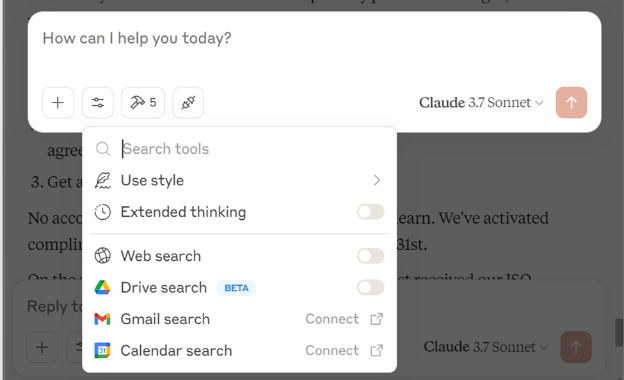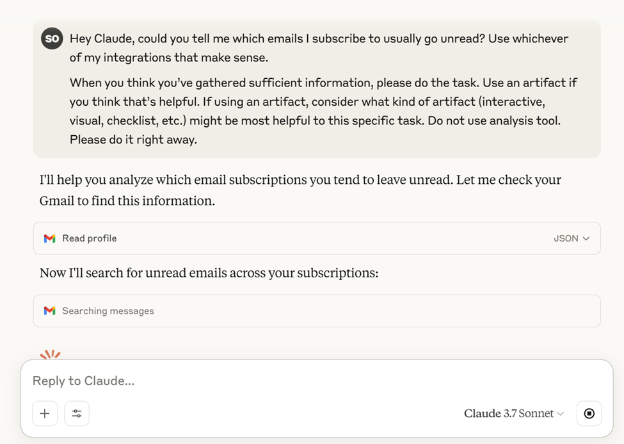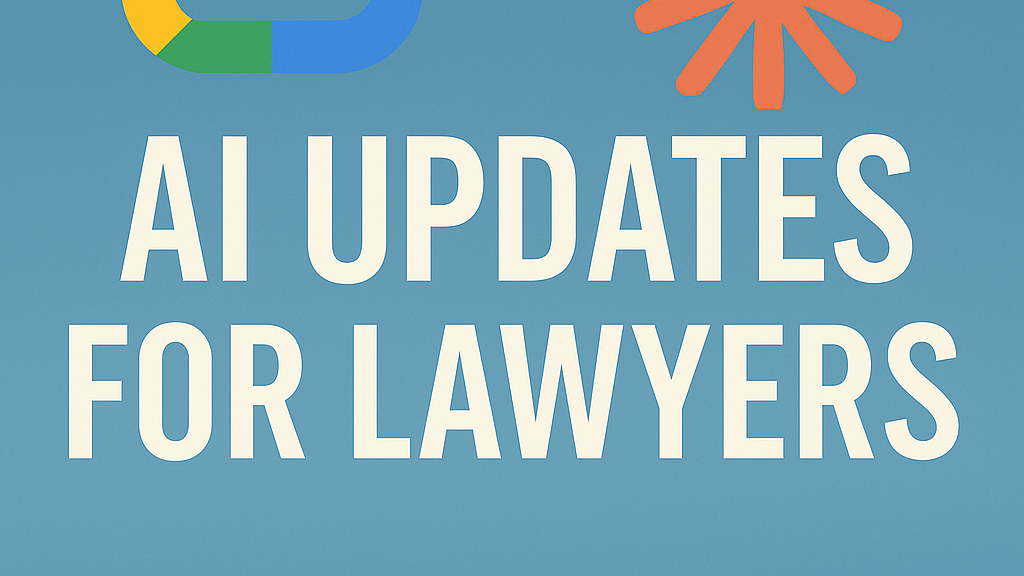Claude can search through emails; Google Sheets integrates AI; UseJunior achieves ISO 27001 certification
Executive Summary: Anthropic added research ability to Claude, including the ability to search Gmail and Google Calendar. Google Workspace embedded AI directly into Google Sheets. UseJunior achieved ISO 27001 data security certification. Cleary Gottlieb is pioneering agentic AI for “boring” low-stakes tasks
1. Google Sheets Integrates AI into Tables
Google has begun embedding AI capabilities directly into Google Sheets tables. Users can leverage AI functions to automatically populate cells based on context from other parts of the sheet or external data. Examples include extracting specific data points from contract text (e.g., parties, term, and termination) and display the results directly in a table structure.[1] The AI can be used using a cell formula syntax like “=ai([prompt cell], [data cells])”. An example screenshot is shown below.
Why It Matters for Lawyers: For lawyers, this feature could accelerate tasks like contract review for due diligence or extracting deal points from past contracts. Users who prefer interacting with AI via a table interface now have another option in addition to tools like V7 and Hebbia

Screenshot of Google Sheets with AI-generated outputs (the four cells highlighted blue) based on contract text (provided in the left column).
2. Claude Introduces “Research” Feature and Gmail and Google Workspace Integration
Anthropic’s Claude launched Claude Research on April 15, 2025, expanding its capabilities beyond web searches to include Gmail and Google Drive files. The “Research” feature allows Claude to perform multi-step searches across the web and internal work contexts, synthesizing information with citations. Additionally, the integration with Google Calendar enables Claude to reason over a user’s schedule for enhanced contextual understanding. These features are rolling out in beta for paid plans.[2] A screenshot of the feature in action is shown below.
Why It Matters for Lawyers: Integrating agentic AI directly with a lawyer’s own internal documents, emails, and calendar offers significant potential for streamlining workflows like meeting preparation, summarizing internal communications, tracking action items and locating relevant information across emails, potentially saving hours of manual effort.

Claude now enables integration with email, calendar and Google Drive.

Screenshot of an interaction with Claude in which Claude reviews emails to generate its response.
3. UseJunior Achieves ISO 27001 Certification
UseJunior, the legal AI company responsible for these weekly update articles, has achieved ISO 27001 Certification,[3] a globally recognized standard for information security management. This milestone underscores the industry’s increasing emphasis on safeguarding sensitive client data—a priority for lawyers adopting AI tools. This certification positions UseJunior as a trusted option for law firms prioritizing compliance and security in their tech stack.
4. Cleary Gottlieb Pioneers Agentic AI for “Boring” Use Cases
Cleary Gottlieb Steen & Hamilton LLP is taking a pragmatic approach to agentic AI, starting with low-stakes tasks like email triage. In a LinkedIn post, Victoria C. Albrecht of Cleary emphasized starting small: “Triage emails. Answer FAQs. Sort documents. If your AI messes up here, no one’s getting sued.” [4] This strategy aligns with her five-point playbook for law firms: combining action with reasoning, keeping stakes low, maintaining human oversight, ensuring clean data, and iterating on small wins. For lawyers, Cleary’s approach offers a blueprint for safe, incremental AI adoption, contrasting with the hype of more ambitious but riskier applications.
5. xAI Makes Grok 3 Models Available via API
xAI has made its Grok 3 models generally available to developers through an API, starting around April 3, 2025. This includes models like grok-3-beta and grok-3-mini-beta, allowing integration into third-party applications and custom workflows.[5] The availability of another major AI model provider via API increases options for legal tech developers and law firms building custom AI solutions, offering potentially different strengths in areas like reasoning or specific knowledge domains. But practical adoption will depend on how legal tech providers integrate the API into apps.
6. OpenAI’s New Reasoning Models Face Hallucination Challenges
OpenAI’s o3 and o4-mini models, designed for advanced reasoning, have shown a troubling rise in hallucination rates—where the AI generates false or misleading information. According to Tech in Asia and Mashable, internal OpenAI benchmarks, including the PersonQA system card, reveal higher hallucination rates compared to previous models, corroborated by OpenAI’s own system card data and external benchmarks like Hugging Face.[6]
Why It Matters for Lawyers: Legal professionals should implement especially robust verification processes when working with OpenAI’s newest reasoning models or consider alternatives like Google’s Gemini or Anthropic’s Claude, which have shown stronger factual grounding in recent rankings.[7] This development builds on last week’s report of ChatGPT-4o’s “praise bias,” further highlighting OpenAI’s challenges with reliability.
Conflicts of Interest
The author practiced law for six years at Ropes & Gray LLP prior to co-founding UseJunior. UseJunior is a member of both Google for Startups and Microsoft for Startups and has received grants and in-kind contributions in connection with these programs. The views expressed herein are our own and do not represent the views of Google, Microsoft or Ropes & Gray LLP. This is not legal advice.
References
- Observation based on Google Workspace updates and user interface elements appearing in Google Sheets, circa April 2025; see also Spreadsheet AI, GOOGLE WORKSPACE, https://workspace.google.com/resources/spreadsheet-ai (last visited Apr. 25, 2025).
- Anthropic, Claude takes research to new places, ANTHROPIC NEWS (Apr. 15, 2025), https://www.anthropic.com/news/research (last visited Apr. 25, 2025).
- UseJunior, Trust Center, https://trust.usejunior.com/ (last visited Apr. 25, 2025).
- Victoria C. Albrecht, Everyone’s hyped about “Agentic AI” in law…, LINKEDIN (Apr. 2025), https://www.google.com/search?q=https://www.linkedin.com/posts/victoriaalbrecht_legaltech-agenticai-agents-activity-7321433199924989953-WXfY (last visited Apr. 25, 2025).
- xAI, What’s New?, xAI Docs (Apr. 3, 2025), https://docs.x.ai/docs/release-notes (last visited Apr. 25, 2025) (documenting general availability of Grok 3 models via API).
- See, e.g., OpenAI’s new reasoning models see rise in hallucination rates, TECH IN ASIA (Apr. 19, 2025), https://www.techinasia.com/openais-new-reasoning-models-see-rise-in-hallucination-rates; OpenAI’s o3 and o4-mini hallucinate way higher than previous models, MASHABLE (Apr. 19, 2025), https://mashable.com/article/openai-o3-o4-mini-hallucinate-higher-previous-models (both reporting on OpenAI system card data showing increased hallucination rates for o3 and o4-mini on the PersonQA benchmark compared to prior models).
- The FACTS Grounding Leaderboard, Kaggle, https://www.kaggle.com/facts-leaderboard (last visited Apr. 25, 2025).
About Steven Obiajulu, David McCalib and Joseph Obiajulu

Steven Obiajulu, David McCalib and Joseph Obiajulu
Steven Obiajulu is a former Ropes & Gray attorney with deep expertise in law and technology. Harvard Law '18 and MIT '13 graduate combining technical engineering background with legal practice to build accessible AI solutions for transactional lawyers.

Steven Obiajulu, David McCalib and Joseph Obiajulu
David McCalib is an MIT-educated polypreneur and founder of Lab0, specializing in robotics, automation, and logistics. Brings extensive experience in product development, industrial engineering, and scaling innovative technology solutions across global markets.

Steven Obiajulu, David McCalib and Joseph Obiajulu
Joseph Obiajulu is a Princeton Mathematics graduate and current NYU medical student with extensive software engineering experience at Bloomberg. Air National Guard officer combining computational genomics expertise with full-stack development skills.
